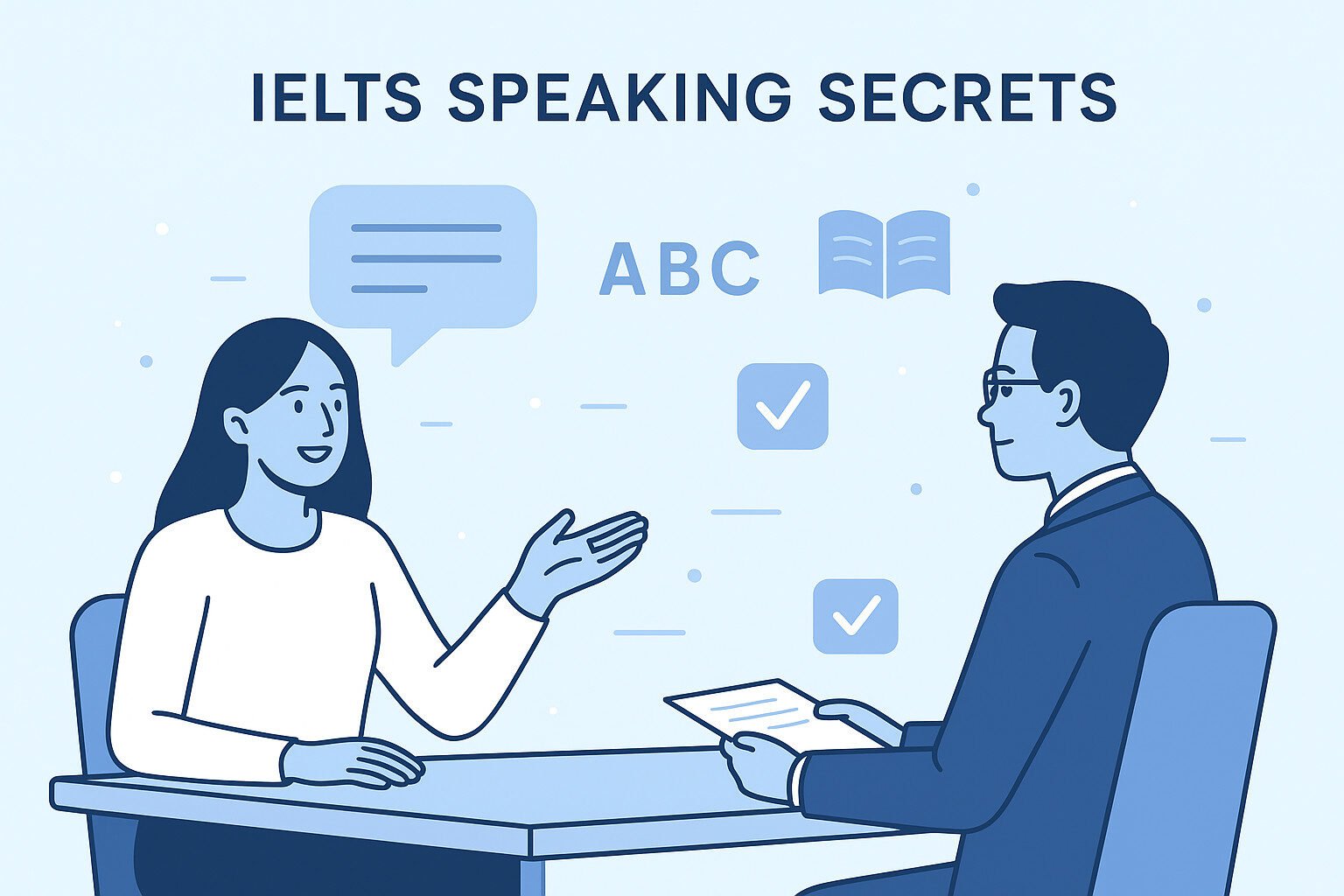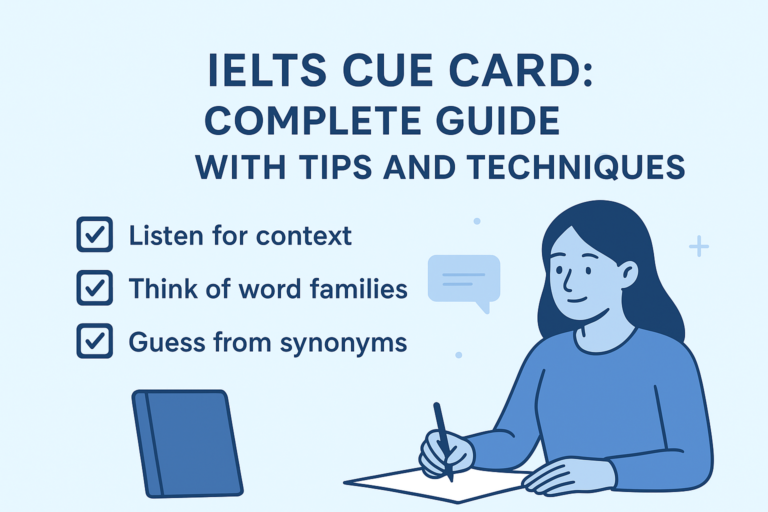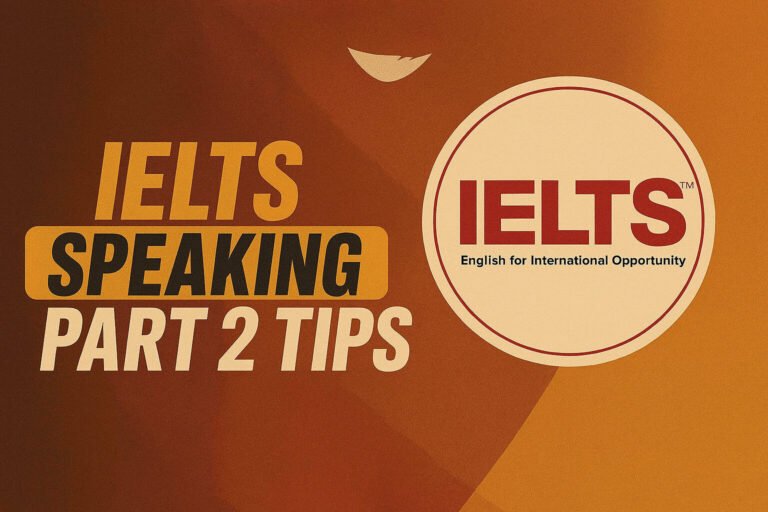The IELTS Speaking test can feel intimidating for many students. Sitting across from an examiner, being asked unexpected questions, and speaking fluently in English is not easy. But here’s the secret: IELTS Speaking is not about being a “perfect English speaker.” It’s about showing you can communicate clearly, naturally, and confidently.
In this guide, we’ll explore powerful speaking secrets that IELTS experts and examiners recommend. You’ll learn how to avoid common mistakes, practice effectively, and boost your score. By the end, you’ll feel more confident in handling any IELTS Speaking question.
Secret 1: Speak Naturally, Not Perfectly
Many students believe they must speak like a native speaker to score Band 7 or higher. This is a myth. The examiner is not testing your accent—they are testing fluency, coherence, vocabulary, grammar, and pronunciation.
Focus on natural communication rather than memorizing perfect sentences.
Example:
❌ Wrong (memorized):
“I have always harbored an inclination towards perusing novels.”
✅ Better (natural):
“I really enjoy reading novels, especially when I have free time.”
The second answer is simpler, more natural, and more effective.
Secret 2: Expand Your Answers
One-word or very short answers can hurt your fluency score. Always try to expand your response with details, reasons, and examples.
Example Question:
Do you like watching movies?
❌ Short Answer: “Yes, I do.”
✅ Expanded Answer: “Yes, I really enjoy watching movies, especially action and adventure films. They help me relax after a busy day, and sometimes I even learn new English phrases from them.”
Use the “S-R-E” formula: Statement → Reason → Example.
Secret 3: Avoid Overthinking Grammar
Grammar is important, but don’t let it block your fluency. Examiners prefer a fluent answer with a small grammar mistake over a perfect but hesitant answer.
Practice Tip:
Record yourself speaking on a topic for 2 minutes. Don’t stop to correct mistakes. Then listen to your recording and notice patterns. This way, you improve both fluency and accuracy over time.
Secret 4: Use IELTS Vocabulary Naturally
Students often memorize long word lists but forget to use them naturally. The secret is to learn topic-specific vocabulary and practice it in sentences.
Example Topic: Technology
Instead of only saying “mobile phone,” try words like:
“smartphone”
“digital device”
“app-based service”
Example: “I use my smartphone almost every day for both communication and learning. Recently, I’ve been using an app-based service to practice English.”
Secret 5: Master the Cue Card (Part 2)
Part 2 of the IELTS Speaking test (the cue card) is often the hardest. You have 1 minute to prepare and 1–2 minutes to speak.
Pro Tips:
Make a quick mind map with keywords.
Follow a simple structure: Introduction → Main Points → Conclusion.
Use storytelling: The examiner loves natural stories.
Example Cue Card: Describe a memorable trip you had.
Answer:
“One of the most memorable trips I had was to Cox’s Bazar last year. I went with my family, and we stayed there for three days. The beach was beautiful, and we enjoyed fresh seafood every evening. It was relaxing, and I still remember the sunset over the sea—it was breathtaking.”
Secret 6: Practice with Real Test Materials
The best way to prepare is by practicing with authentic IELTS resources. Cambridge IELTS books, especially the latest ones like Cambridge IELTS 19 Academic PDF, provide real exam questions.
Benefits of Practicing with Cambridge IELTS:
You get familiar with real examiner-style questions.
You improve your time management.
You can compare your answers with sample responses.
Tip: Don’t just practice once—repeat the same test multiple times to see improvement.
Practice Exercise: Self-Speaking Drill
Choose one of these common IELTS Speaking questions and record yourself:
Do you prefer studying alone or with others? Why?
What kind of music do you enjoy listening to?
Describe a person who inspires you.
After recording:
Check if you expanded your answer.
Notice if you used topic-specific vocabulary.
Identify if grammar mistakes blocked fluency.
Extra Examiner Tips (From Real Insights)
Be yourself: Don’t pretend to be someone you’re not.
Smile and stay confident: It helps your tone sound more positive.
Don’t memorize full answers: Examiners can tell.
If you don’t understand a question, ask politely: “Could you please repeat that?” is acceptable.
Quick Table: Fluency vs. Accuracy Balance
| Band Score Range | Fluency & Coherence | Grammar Accuracy | Vocabulary | Pronunciation |
|---|---|---|---|---|
| Band 5–5.5 | Frequent pauses, short answers | Many errors, affect meaning | Limited | Difficult to understand |
| Band 6–6.5 | Some hesitation, attempts longer answers | Errors but meaning clear | Moderate range | Mostly clear |
| Band 7–8+ | Smooth, confident, expanded answers | Few errors, don’t affect meaning | Wide range, natural | Clear, natural, easy to follow |
FAQs
Q1: Do I need a British or American accent for IELTS Speaking?
No. Any clear accent is accepted as long as you are understandable.
Q2: How long should my answers be?
In Part 1, 2–4 sentences is fine. In Part 2, aim for 1–2 minutes. In Part 3, give more detailed, thoughtful answers.
Q3: Can I use informal English?
Yes, a natural conversational style is good. Just avoid slang like “yo” or “wassup.”
Q4: How do I improve fluency quickly?
Practice speaking every day with a timer. Record yourself, listen, and improve.
Q5: What if I make a grammar mistake while speaking?
Keep going. Don’t stop to correct yourself unless it’s a big mistake.
Conclusion
IELTS Speaking doesn’t require perfect English—it requires confidence, natural communication, and smart preparation. By speaking naturally, expanding your answers, using vocabulary wisely, and practicing with real materials like Cambridge IELTS 19 Academic PDF, you can move closer to your dream band score.
Start practicing today. The more you speak, the more natural you’ll sound. Remember: the examiner wants to hear your story in your words.








